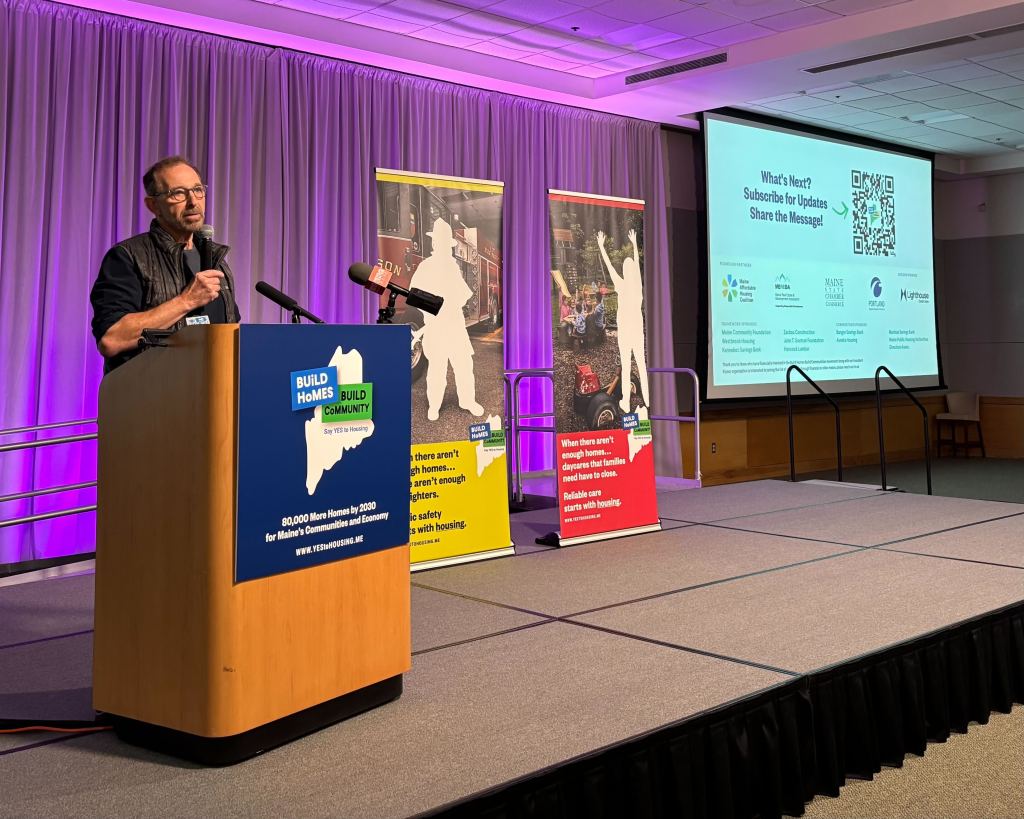
SCARBOROUGH — David Turin rattles off several former employees who have moved out of state or to more rural areas of Maine because they couldn’t find housing near his restaurants in Portland and South Portland.
He could name 15 more, he says, because Maine’s housing shortage is so acute, many people cannot afford to live in the communities where they work. Those who aren’t cash strapped have few housing options to choose from.
“The lack of housing is crushing the restaurant industry,” says Turin, head chef and owner of David’s and David’s Opus Ten in Portland and David’s 388 in South Portland.
Turin is preaching to the choir, standing before more than 100 people gathered Wednesday for the launch of a new business-based, statewide coalition formed to aggressively promote home construction as an increasingly necessary component of economic development.
Build Homes Build Community is a nonpartisan, research-driven coalition led by the Maine Affordable Housing Coalition, Maine Real Estate & Development Association, Maine State Chamber of Commerce and the Portland Regional Chamber of Commerce. Partners include lending institutions, construction and building supply companies, housing authorities and developers, and nonprofit foundations.
Coalition members noted a 2023 report that said Maine needed to produce 84,000 new homes by 2030 to accommodate its existing population and those expected to move here.
While the state’s progress in reaching that goal is unclear, the continued lack of housing is compounding staffing shortages and forcing some businesses to close, they said. It’s also keeping older adults from downsizing and freeing up housing that would be ideal for families.
DRAG ON MAINE’S ECONOMY
If workers cannot find housing, it’s a drag on the economy that threatens Maine’s future, said Patrick Woodcock, CEO of the Maine State Chamber of Commerce.

Woodcock quoted a new report from the Maine Consensus Economic Forecasting Commission, whose latest employment forecast anticipates 0.2% growth in 2025 and 0.1% growth in 2026 with flat employment numbers through 2029.
The commission’s assessment reflects information provided by the Maine Department of Labor, as well as broad economic uncertainty and demographic constraints, particularly related to the state’s growing dependence on international immigration.
“It’s an anchor on our economy,” Woodcock said. “We will not grow our economy if we don’t grow our workforce.”
Quincy Hentzel, CEO of the Portland Regional Chamber of Commerce, said the housing shortage isn’t a single-industry issue, but it’s hitting Maine’s hospitality sector especially hard.
Restaurants, hotels and other tourism-related businesses struggle to find and retain workers, she said, and those who stay often have to travel far from home to work each day.
MORE HOUSING OF ALL KINDS
Facing the housing shortage head on, General Dynamics Bath Iron Works broke ground last month on an 84-unit apartment complex near the shipyard that will be available to its workers in mid-2027, the company announced.
The project is one of several BIW initiatives supported by a $34 million federal defense appropriation in 2024 that was sought by Maine’s congressional delegation. BIW has about 6,500 workers who build Navy destroyers.
“We need more housing of all types and all sizes,” said Laura Mitchell, executive director of the Maine Affordable Housing Coalition.
Mitchell said the coalition has a five-point action plan:
- Lower the cost of housing construction by reducing unnecessary regulation;
- Encourage communities to welcome housing through targeted state assistance;
- Promote connected communities where services are close and Mainers can thrive;
- Accelerate permit approvals at the state and local level;
- Fund affordable housing construction for those who need it.
The coalition also plans to encourage individuals to advocate for housing projects in their communities, by speaking up at planning board meetings or volunteering to help update or draft a comprehensive plan that prioritizes housing.
Municipalities can help by allowing smaller homes on smaller lots, establishing growth zones where homes can be built and offering incentives for developers such as tax breaks or reduced fees.
“Whatever lane you’re in, find a way to make a difference,” said Kathy Hall, vice president of corporate affairs at Lighthouse Credit Union. “We can’t do this alone.”

We invite you to add your comments. We encourage a thoughtful exchange of ideas and information on this website. By joining the conversation, you are agreeing to our commenting policy and terms of use. More information is found on our FAQs. You can modify your screen name here.
Comments are managed by our staff during regular business hours Monday through Friday as well as limited hours on Saturday and Sunday. Comments held for moderation outside of those hours may take longer to approve.
Join the Conversation
Please sign into your CentralMaine.com account to participate in conversations below. If you do not have an account, you can register or subscribe. Questions? Please see our FAQs.